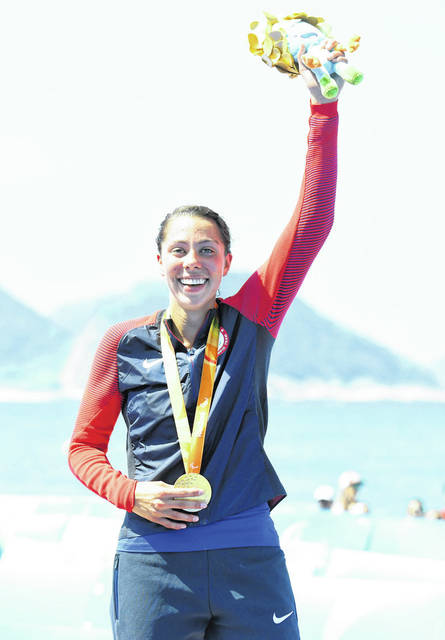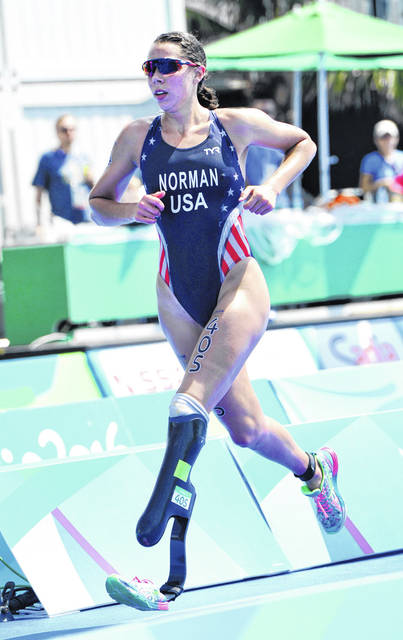


COLUMBUS, Ind. — Watching the 2012 Paralympic trials as a 14-year-old, Grace Norman never imagined she would some day be a reigning gold medalist.
“No, definitely not,” the Xenia Christian and Cedarville University alum said via Zoom Tuesday. “Most athletes’ dreams is to become an Olympian, Paralympian, or compete at the highest level that they can. That was obviously a dream of mine.”
What’s the cliche about dreams coming true? In this case not once but twice.
Norman, 23, was officially announced Monday as a member of the 2021 US Paralympic team which will compete in Tokyo in late August and early September. She will defend her triathlon title against the best in the world after winning the inaugural triathlon gold medal in her category at the 2016 Rio games. Norman earned a spot in this year’s Paralympics when she won the recent Americas Triathlon Para Championships in Wisconsin.
“I’m very excited to be going back to my second Paralympic games,” Norman said while taking a break from intense training in Columbus, Ind. “It is such an honor just to be named to the team.”
Norman was born with congenital constriction band syndrome in her left leg at birth, which resulted in the amputation of her left leg leg below the knee and her right big to when she was young. She now runs with a J-shaped, carbon fiber prosthetic.
Norman — who earned a nursing degree at Cedarville — had run and swam often as a youngster. But her encounter with Paralympians during the aforementioned trials in Indianapolis “immediately inspired” her.
“That really sparked my interest and my fire to become a Paralympian,” she said.
Her father, Dr. Tim Norman, later piqued interest in the triathlon.
“I saw the excitement that my dad had in it,” Norman said. “I decided that if I could do good at swimming and running, I’m sure I could figure out the biking part. That’s proved a lot harder than I thought originally at the beginning.”
After winning gold in 2016 and having an undefeated season in 2017, Norman hit a slump, getting beat by two or three minutes in 20-kilometer cycling events, which is a large gap. About 10 months ago she switched coaches, hooking up with Greg Mueller, a South Bend, Ind., native and cycling guru.
“I wanted to make sure that I had turned over all the stones and was doing everything possible in order to be the best I could,” Norman said. “That’s what ultimately led me to Greg. I just needed something that was going to work better with me. The workouts have fit me a little better. We have pulled away a lot of my weaknesses and made them become my strengths. I definitely think the switch has helped put me in a way better position than what I was before.”
Mueller has been impressed with Norman’s stamina and workout tolerance.
“We’ve been pushing that limit,” he said, calling her degree of fitness a high level for someone who has both feet. Mueller said if Norman competed in a local triathlon against athletes with both feet, she could not only compete, but she could also win.
That’s the plan for Tokyo.
“I’ve been working for five years now post-Rio to win a second gold medal,” Norman said. “I will not settle for anything less during the competition. The Paralympics is the highest stage I can compete on.”
Anticipating victory was not necessarily the case prior to the 2016 games.
“I learned a lot from my experiences in Rio,” Norman said. “Don’t underestimate yourself. Going into that race I was not a favorite to win. I had never beaten the woman that I had raced against. The win was kind of shock for me and a lot of people. That kind of reinforced to myself, don’t set those limits. I didn’t think my gold medal was possible.”
Now it’s quite possible Norman will have two.




